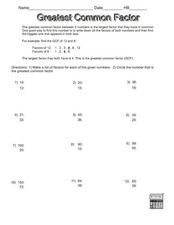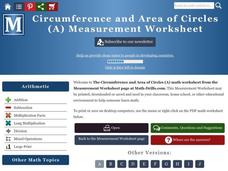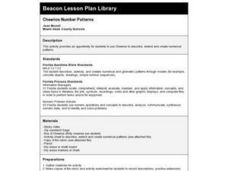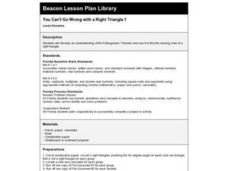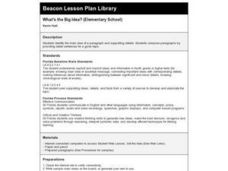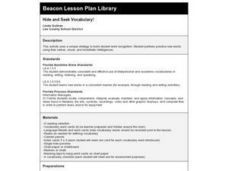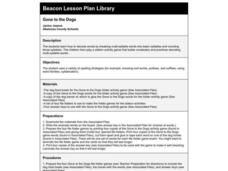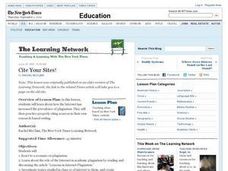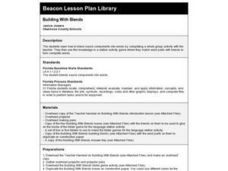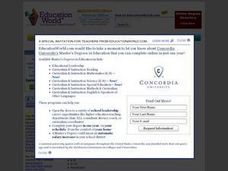Curated OER
Greatest Common Factor
For this greatest common factor worksheet, students find the GCF of given terms. This one-page worksheet contains 16 problems, with answers.
Curated OER
Circumference and Area of Circles
In this circumference and area learning exercise, students find each for a set of 12 given circles; either diameter or radius are given. A website reference for additional resources and answers are provided.
Curated OER
Circumference and Area of Circles
In this circumference and area of circles worksheet, students find each to 1 decimal place of 12 given circles. A website reference for additional resources and answer key are given.
Curated OER
Plaque Busters
Students work with the scientific method; observation, hypothesis, and experimentation. They observe the effects of decay and the need of good oral hygiene during an experiment with an apple.
Curated OER
Scatter Brain
Examine a coordinated geometry grid to decode the hidden message. Pupils write a coded message to their parents using letter coordinates from the grid.
Curated OER
Pacing a Gunther Chain
Students pace a Gunther Chain, a measurement used by foresters to determine distance and area. They discuss that pacing is individualized depending on age, gender, etc. They practice to find an average pace. Teams estimate, pace and...
Curated OER
So Many Cats!
First graders listen to the book, So Many Cats, and discuss the number of cats in the story. They demonstrate simple addition problems using cat counters and a work mat in the shape of a house.
Curated OER
I Can Use a Worm to Count
Kindergarteners use worms, puppets or other props to practice counting to 100. First, they listen to a read aloud of Count Worms by Roger Hargeaves. A worm pattern is used to count to 100, with each segment of the worm representing a...
Curated OER
Cheerios Number Patterns
Young scholars, following a provided worksheet, use Cheerios to explore number patterns.
Curated OER
Fraction and Decimal Ordering
Ordering numbers just got physical! Learners practice putting numbers in sequence, both in fraction and decimal form. To begin, they line up in birthday order and discuss the difference between ascending and descending. They are then...
Curated OER
Tetrahedron Kites
Let's go fly a kite! Discuss the concept of two-dimensional and three-dimensional objects with your math class. They examine a triangle and discuss the face, vertices, edges, and angles. Then they build their own Tetrahedral Kites and...
Curated OER
You Can't Go Wrong with a Right Triangle 1
Fourth and fifth graders study the Pythagorean Theorem and apply it to find the missing side of a right triangle.
Curated OER
Yo! Conventions!
Learners get in groups, take a list of words, put them into story form, and punctuate them. They present their story to the class and consider how punctuation changes meaning. Great excercise.
Curated OER
What's the Big Idea
Discuss the concept of main idea in a story or other reading material. Middle schoolers identify the main idea in a passage using a technique that eliminates unnecessary words not relevant to the main idea.
Curated OER
Rest in Peace, Maniac Magee
Scholars read Maniac Magee and create epitaphs for each of the major characters using precise words reflecting the individual characters personality and nature. They will learn what an epitaph is and practice writing their own. They can...
Curated OER
Nym Family
List and identify words for each part of the "Nym" family: synonyms, antonyms and homonyms. Middle schoolers place words in the correct category, then find the corresponding mate in a dictionary or thesaurus.
Curated OER
Media Literacy
Elementary learners observe and discuss advertisements for tobacco and alcohol. They identify how advertisers place information in strategic spots and make their product look good. They choose an ad and fill out the attached form on...
Curated OER
Lots of Lessons from Aesop
Aesop’s Fables offer young learners an opportunity to study figurative language. After reviewing theme, simile, alliteration, and metaphor, model for your pupils how to identify examples of these devices in the fable. Class members then...
Curated OER
Hide and Seek Vocabulary!
Third graders practice word recognition and vocabulary building. They find word cards in the classroom. Then they practice reading the words and using them in sentences. Additional practice is gained by writing the words and using them...
Curated OER
Help Me Learn About the Holocaust
Young readers select a book from a provided list to use as the basis for an intensive class study of Holocaust novels. After completing their novels, groups create a multimedia presentation highlighting the elements of literature...
Curated OER
Gone to the Dogs
Approach vocabulary through decoding and chunking. Your class breaks up words into basic syllables or chunks then engages in a decoding activity. Useful for a variety of language levels and grades, just modify to fit your class.
Curated OER
Cite Your Sites
What information would you find in an almanac that you would not find in an atlas? What is the difference between a dictionary and a thesaurus? Using a Cite Your Sites worksheet on which they record their observations, groups participate...
Curated OER
Building With Blends
Understanding consonant blends is crucial for young readers. In this language arts instructional activity, students examine consonant blends, and play the folder game, "Building With Blends," in small groups. The game is especially...
Curated OER
Marmots: Groundhogs of the World
Students research 14 groundhog species found around the world, including the woodchuck. They use the internet to research groundhogs and students organize their information using a graphic organizer.
Other popular searches
- Science Learning Centers
- Math Learning Centers
- Hands on Learning Centers
- Measurement Learning Centers
- Space Learning Centers
- Literacy Learning Centers
- Alphabet Learning Centers
- Ideas for Learning Centers
- Electricity Learning Centers
- Hand Math Learning Centers
- Easy Math Learning Centers
- Planet Learning Centers


